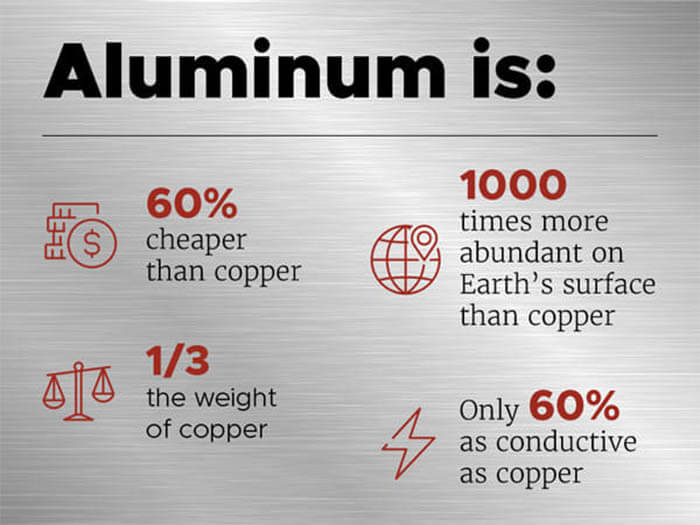When comparing the electrical conductivity of aluminum and copper, several factors should be considered, including their intrinsic electrical properties, weight, cost, and common applications. Here is a detailed comparison:
Electrical Conductivity
- Copper: Copper has an electrical conductivity of approximately 5.96×107S/m (siemens per meter). It is the standard by which other conductors are measured and is assigned a conductivity of 100% International Annealed Copper Standard (IACS).
- Aluminum: Aluminum has an electrical conductivity of about 3.77×107S/m, which is approximately 63% that of copper IACS.
Weight and Density
- Copper: The density of copper is about 8.96 g/cm³. This makes copper relatively heavy compared to aluminum.
- Aluminum: The density of aluminum is around 2.7 g/cm³. Aluminum is much lighter, about one-third the weight of copper.

Strength and Mechanical Properties
- Copper: Copper is stronger and more durable under mechanical stress and can withstand higher loads without deformation.
- Aluminum: Aluminum is more malleable and less prone to breaking but has lower tensile strength compared to copper.
Cost
- Copper: Generally, copper is more expensive due to its higher demand and superior electrical properties.
- Aluminum: Aluminum is less expensive and more abundant, making it a cost-effective alternative in many applications.
Applications
- Copper: Used extensively in electrical wiring, motors, transformers, and power generation systems due to its excellent conductivity and durability.
- Aluminum: Commonly used in power transmission and distribution lines, where its lighter weight can significantly reduce structural support costs.
Practical Considerations
- Size and Weight for Equivalent Conductivity: To achieve the same electrical conductivity as copper, an aluminum conductor must have a larger cross-sectional area. However, even with a larger size, the overall weight of aluminum conductors is still lower than that of copper conductors.
- Corrosion Resistance: Aluminum forms a protective oxide layer that makes it resistant to corrosion. Copper can corrode, especially in certain environments, but this is often managed with proper coatings and treatments.
- Connection Reliability: Aluminum requires careful handling to ensure secure connections, as it can expand and contract more than copper with temperature changes, potentially leading to loose connections over time. Special connectors and installation techniques are used to mitigate this.
